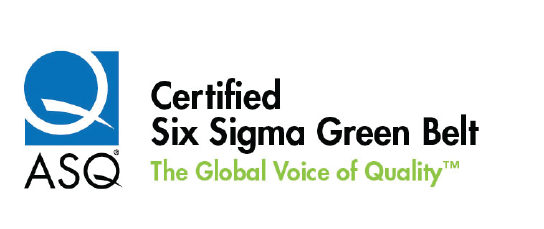Six Sigma Green Belt
Six Sigma Green Belt
Six Sigma is a customer-focused, data-driven methodology that is widely used to analyze and improve the performance of processes, products, and services. Green Belts can participate in—or lead—Six Sigma projects on a part-time basis under the guidance of a Black Belt.
Target Audience
This qualification is highly recommended for professionals involved in solving quality problem, participate in quality improvement projects, business process owners, and functional managers.
Course Prerequisites
Candidates must have three years of on-the-job experience in one or more areas of the Six Sigma Green Belt Body of Knowledge.
Course Outline
The Six Sigma Green Belt course includes following topics:
- Overview – Six Sigma & Organizational Goals, Lean Principles in the Organization, Design for Six Sigma (DFSS) Methodologies
- Define Phase – Project Identification, Voice of the Customer (VoC), Project Management Basics, Management and Planning Tools, Business Results for Projects, Team Dynamics & Performance
- Measure Phase – Process Analysis & Documentation, Probability & Statistics, Statistical Distributions, Collecting & Summarizing Data, Measurement System Analysis (MSA), Process & Performance capability
- Analyze Phase – Exploratory Data Analysis, Hypothesis Testing
- Improve Phase – Design of Experiments (DoE), Root Cause Analysis, Lean Tools
- Control Phase – Statistical Process Control (SPC), Control Plan, Lean Tools for Process Control
Learning Outcomes
Successful learners will be able to:
- Build problem solving, analytical, and business acumen skills
- Implement successful change management in your company/organization
- Master Six Sigma methodologies, tools, and techniques (DMAIC, DMADV)
- Identify the root cause of a problem and prevent recurrence
- Learn process improvement, data analysis, and project management skills
- Prepares you for a leadership role such as a Certified Six Sigma Black Belt
Assessment Methodology
Each certification candidate is required to pass a written examination that consists of multiple-choice questions (MCQ) that measure comprehension of the body of knowledge.

























